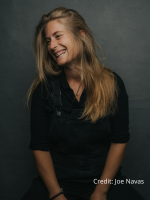The Agrarian Trust is a national land trust trying to reimagine American land ownership. As American farm land becomes consolidated into fewer and fewer hands, the trust wants to help communities move in the opposite direction—to help people across the U.S. buy and hold farm land collectively. One of the first groups to join the organization as a so-called Agrarian Commons is the Somali Bantu Community Association of central Maine.
“This organization was founded around helping the community. And we never turn away anybody who shows up at our door. But the count we have for farming is about 212 farmers who are farming with us as of 2020," Muhidin Libah, the executive director of the SBCA said.
Muhidin represents a community of about 7,000 Somali refugees who have resettled in Maine beginning in 2005. They started farming in 2014, and the farms they lease are used collectively.
“What we do is we till all the land, we take a measurement and then we divide the land by how many people interested so that is how we come down to the amount of land that people can access.”
On any given day, about 20 to 30 families are out working their plots. On the leased farms, the sheer number of people gathering was enough to cause friction with the landowners.
“There’s a lot of cultural misunderstandings and the power dynamic was so big, where can you drive, where can you park, all these pieces. So that is when we decided to look around and try to get a piece of land of our own.”
The Somali Bantu Community Association partnered with the Agrarian Trust to secure a 107-acre farm in Wales Maine.
“So right now between the Agrarian Trust and the Somali Bantu Community we created another C-2 Commons called Little Jubba Central Maine which will be holding the land for us.”
Muhidin says that while Somali growers have been farming together and sharing land since 2014, until they secured the Little Jubba Commons, it hasn’t really felt like they can farm in a way that feels communal.
“There were a lot of pieces, cultural pieces that were missing from the leased land. So on this farm we are able to improvise and add a lot of traditional pieces that we used to have back home in Africa. We can make buildings where kids can play. We can turn one of the buildings into a community meeting space where the community can come.”
Muhidin also mentions art—painting murals, building scarecrows—and says the farm is a place for people to get out of their apartments and feel the breeze. One of the requirements of the Agrarian Commons partnership is that the land is farmed regeneratively. And usually this word is used in a strictly environmental sense like rebuilding topsoil and sequestering carbon—its about regenerating the actual earth. But it’s clear talking with Muhidin that the Somali community is thinking about regeneration more holistically. He says where he’s from in Africa, land always belongs to the whole community.
“Like right now if you move from one village in Somali to another village all you need to do is show up at the elder’s place and tell them you’re moving here you need a piece of land to build, a piece of land to farm. You are given those for free as long as you just follow the village rules. So we are still thinking the same. So when we see people doing like this is my property they are closing down their properties and stuff people wonder, why are these people so private?”
Why are these people so private? It’s a question worth asking. The Somali Bantu Community Association’s Little Jubba is one of ten Agrarian Commons launched in 2020 in the United States. Little Jubba is one of three in New England—the other two are in New Hampshire and Vermont. I think it’s exciting to think about farmland as a way to regenerate not just the land but also a sense of belonging.







